-
RESEARCH01-01-2017
Job satisfaction in an oncology nursing team
Revista Brasileira de Enfermagem. 2017;70(5):988-995
Abstract
RESEARCHJob satisfaction in an oncology nursing team
Revista Brasileira de Enfermagem. 2017;70(5):988-995
DOI 10.1590/0034-7167-2016-0422
Views0See moreABSTRACT
Objective:
to identify the level of attributed, perceived and real job satisfaction of oncology nursing professionals and analyze the relationships between the levels of satisfaction among these workers.
Method:
a descriptive, quantitative cross-sectional study was conducted using the Index of Work Satisfaction (IWS) to evaluate the nursing team, nurses and technicians/auxiliaries. A total of 348 workers answered the questionnaire, of which 216 were fully completed and considered for the IWS calculation.
Results:
Autonomy was considered the most important item in attributed satisfaction for the nursing team and nurses. Salary was valorized most by the technicians/auxiliaries. For perceived satisfaction, Professional Status was the most important for all workers. Regarding real satisfaction, Interaction was the most important for the nursing team and technicians/auxiliaries; while the nurses valorized Autonomy. The nurses presented the greatest job satisfaction.
Conclusion:
a discrepancy was observed in job satisfaction among the oncology nurses, indicating the importance of further quantitative research.
-
RESEARCH01-01-2017
Relational technologies as instruments of care in the Family Health Strategy
Revista Brasileira de Enfermagem. 2017;70(5):981-987
Abstract
RESEARCHRelational technologies as instruments of care in the Family Health Strategy
Revista Brasileira de Enfermagem. 2017;70(5):981-987
DOI 10.1590/0034-7167-2016-0337
Views0See moreABSTRACT
Objective:
This article aims to identify the relational technologies used by Family Health Strategy nurses in their daily work when treating patients.
Method:
Descriptive and cross-sectional study with qualitative approach; conducted between May and July 2015, in three Basic Health Units of the Southern Region of the Municipality of São Paulo, with 19 nurses of the Family Health Strategy. Data were collected through a semi-structured interview, and the speeches were fully transcribed and analyzed according to the technique of content analysis.
Results:
From the speeches of the participants, three categories emerged, showing the unawareness of the concept, but the valorization of its use; which are the relational technologies used by the participating nurses (communication, listening, empathy and welcoming reception), as well as the report of barriers to the use of relational technologies.
Final consideration:
Although the nurses value the use of relational technologies, the participants denoted unawareness of the nomenclature and its associated concepts, suggesting superficiality in the understanding and use of these instruments in the context of care in the Family Health Strategy.
-
RESEARCH01-01-2017
Knowledge and practice in mental health nursing care
Revista Brasileira de Enfermagem. 2017;70(5):973-980
Abstract
RESEARCHKnowledge and practice in mental health nursing care
Revista Brasileira de Enfermagem. 2017;70(5):973-980
DOI 10.1590/0034-7167-2016-0343
Views0See moreABSTRACT
Objective:
To understand mental health nursing care based on the concept of the subject of the unconscious proposed by Lacan.
Method:
A narrative study was carried out with 19 nurses, chosen based on their theoretical approach or referral by other participants, through the snowball sampling technique. The interviews were carried out in person or digitally, and were recorded and fully transcribed.
Results:
The analysis was carried out based on Freudian and Lacanian psychoanalysis, approaching nursing care as it acts on the body, secretions, and excretions, to distinguish it from the spirit of fineness. Effects on care are discussed, considering the subject of the unconscious with its knowledge, creating unique exits (sinthome). In this situation, professionals are required to abstain from a position of knowing what is better for the Other.
Final considerations:
This nursing care perspective offers contributions when discussing the centrality of the subject and words in the care process.
-
RESEARCH01-01-2017
Weaving the West Psychosocial Care Network of the municipality of São Paulo
Revista Brasileira de Enfermagem. 2017;70(5):965-972
Abstract
RESEARCHWeaving the West Psychosocial Care Network of the municipality of São Paulo
Revista Brasileira de Enfermagem. 2017;70(5):965-972
DOI 10.1590/0034-7167-2016-0566
Views0See moreABSTRACT
Objective:
to understand how health service professionals involved in the care of users in psychic distress perceive the organization of the Psychosocial Care Network (RAPS – Rede de Atenção Psicossocial) in the western region of the city of São Paulo.
Method:
qualitative approach study conducted with 123 professionals with higher education who work in the care points of the network. A semi-structured interview was performed and data were submitted to the Alceste program for lexical analysis.
Results:
the network is in process of alignment with the mental health policy and the psychosocial rehabilitation strategy. However, the weaknesses in the work process of teams are related to deficits in human resources, structure, and communication, and to the limited appropriation of their guidelines.
Final considerations:
there are intense efforts of workers to weave the network, and barriers need to be overcome to support successful actions in mental health care in the territory.

-
RESEARCH01-01-2017
Chronotype and work shift in nursing workers of university hospitals
Revista Brasileira de Enfermagem. 2017;70(5):958-964
Abstract
RESEARCHChronotype and work shift in nursing workers of university hospitals
Revista Brasileira de Enfermagem. 2017;70(5):958-964
DOI 10.1590/0034-7167-2016-0542
Views0See moreABSTRACT
Objective:
To identify the predominant chronotype in nursing workers who work in surgical clinics of university hospitals and to verify the association with work shift.
Method:
Cross-sectional study, performed in surgical clinics of university hospitals in the Southern region of Brazil. The sample of 270 nursing workers answered questions of socio-occupational characterization, of health and the Morningness-Eveningness Questionnaire of Horne and Östberg. We performed a descriptive and bivariate analysis with the help of the SPSS software and confidence interval of 95%.
Results:
The indifferent chronotype predominated (45.2%). There were significant differences between occupational categories and variables “age” (p<0.001), “use of medication” (p=0.035) and “choice of work shift” (p=0.001). There was an association between the chronotype and the variables “work leave due to illness” (p=0.021), “children” (p=0.025), “use of medication” (p=0.018) and “work shift” (p=0.001).
Conclusion:
The chronotype remained indifferent, and the results confirmed association between chronotype and work shift.

-
RESEARCH01-01-2017
Difficulties in nutritional counseling and child growth follow-up: from a professional perspective
Revista Brasileira de Enfermagem. 2017;70(5):949-957
Abstract
RESEARCHDifficulties in nutritional counseling and child growth follow-up: from a professional perspective
Revista Brasileira de Enfermagem. 2017;70(5):949-957
DOI 10.1590/0034-7167-2016-0527
Views0ABSTRACT
Introduction:
Nutritional counseling and growth follow-up are priorities when providing care to children; however, these have not been completely incorporated into primary health care.
Objective:
To know the difficulties for providing nutritional counseling and child growth follow-up, from a professional healthcare perspective.
Method:
Qualitative study, using Donabedian as theoretical framework, developed by 53 professionals in the field of primary health care. Data was obtained from focal groups and submitted to content analysis.
Results:
The main difficulties for nutritional counseling were clustered in the category of ‘perceptions and beliefs related to child feeding’. The ‘problems of infrastructure and healthcare’ and ‘maintenance of the hegemonic medical model’ are the main difficulties for following-up growth.
Final considerations:
Besides investments in infrastructure, healthcare training is indispensable considering beliefs and professional experiences, so in fact, nutritional counseling and child growth follow-up are incorporated in primary health care.
Keywords:Child NutritionChildcareNursing Primary Health CarePrimary Health CareResearch, QualitativeSee more
-
RESEARCH01-01-2017
Severity and workload related to adverse events in the ICU
Revista Brasileira de Enfermagem. 2017;70(5):942-948
Abstract
RESEARCHSeverity and workload related to adverse events in the ICU
Revista Brasileira de Enfermagem. 2017;70(5):942-948
DOI 10.1590/0034-7167-2016-0427
Views0See moreABSTRACT
Objective:
To analyze whether an increase in patient severity and nursing workload are correlated to a greater incidence of adverse events (AEs) in critical patients.
Method:
A prospective single cohort study was performed on a sample of 138 patients hospitalized in an intensive care unit (ICU).
Results:
A total of 166 AEs, occurred, affecting 50.7% of the patients. Increased patient severity presented a direct relationship to the probability of AEs occurring. However, nursing workload did not present a statistically significant relationship with the occurrence of AEs.
Conclusion:
The results cast light on the importance of using evaluation tools by the nursing personnel in order to optimize their daily activities and focus on patient safety.
-
RESEARCH01-01-2017
Mental health in the Family Health Strategy as perceived by health professionals
Revista Brasileira de Enfermagem. 2017;70(5):935-941
Abstract
RESEARCHMental health in the Family Health Strategy as perceived by health professionals
Revista Brasileira de Enfermagem. 2017;70(5):935-941
DOI 10.1590/0034-7167-2016-0492
Views0See moreABSTRACT
Objective:
to analyze the management of mental health needs in primary care as perceived by Family Health Strategy professionals.
Method:
this was a qualitative descriptive exploratory study developed within the coverage area of five family health teams. The data were collected using observation, group interviews, individual semi-structured interviews, and focus groups. Content analysis was conducted using text analysis software and interpretation was based on the corresponding analytical structures.
Results:
numerous and challenging mental health demands occur in this setting, for which the teams identified care resources; however, they also indicated difficulties, especially related to the operationalization and integration of such resources.
Conclusion:
there is a need for a care network sensitive to mental health demands that are better coordinated and more effectively managed.

-
ORIGINAL ARTICLE07-29-2024
Evidence of validity of the Risk Self-Medication Questionnaire focused on Health Literacy
Revista Brasileira de Enfermagem. 2024;77(3):e20230386
Abstract
ORIGINAL ARTICLEEvidence of validity of the Risk Self-Medication Questionnaire focused on Health Literacy
Revista Brasileira de Enfermagem. 2024;77(3):e20230386
DOI 10.1590/0034-7167-2023-0386
Views0See moreABSTRACT
Objectives:
to analyze the validity evidence of the internal structure of the Risk Self-Medication Questionnaire Focused on Health Literacy.
Methods:
a psychometric study with 499 adults. The internal structure was assessed with exploratory and confirmatory factor analysis to prove the adjustment. Internal consistency was measured by composite reliability and McDonald’s omega coefficient (ω).
Results:
the parameters revealed a model of 35 items distributed across four factors, explaining 56% of the total variance, with factor loadings ranging from 0.31 to 0.85 and adequate communalities. Accuracy (0.79
Conclusions:
an instrument was obtained with good evidence of structural validity for measuring self-medication.
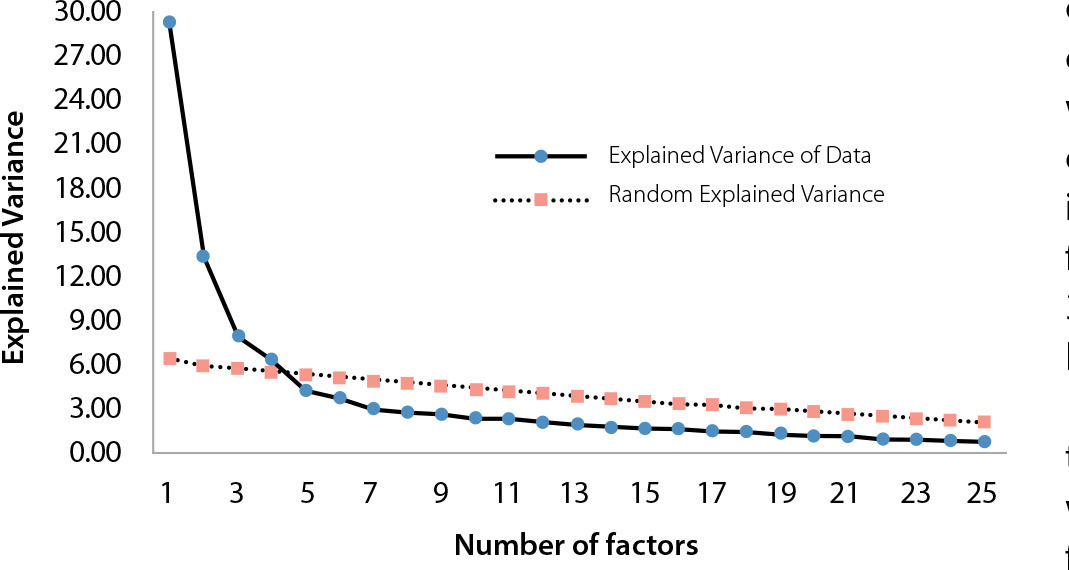
-
ORIGINAL ARTICLE07-29-2024
Nurses’ perspectives on nurses’ work methods
Revista Brasileira de Enfermagem. 2024;77(3):e20230374
Abstract
ORIGINAL ARTICLENurses’ perspectives on nurses’ work methods
Revista Brasileira de Enfermagem. 2024;77(3):e20230374
DOI 10.1590/0034-7167-2023-0374
Views0See moreABSTRACT
Objectives:
To analyze nurses’ perspectives on nurses’ work methods in the hospital context.
Methods:
A descriptive study with a qualitative approach was conducted in a hospital in northern Portugal, involving 17 nurses. Semi-structured interviews were used for data collection. Data collected between May and June 2023 underwent content analysis, supported by Atlas.ti software.
Results:
Three thematic areas emerged: “Nurses’ work methods in a hospital context,” highlighting the conception and components of work methods and the methods in use; “Implementation of nurses’ work methods,” emphasizing influencing factors and challenges to implementation; and “Impact of nurses’ work methods on patients, nurses, and institutions.”
Final Considerations:
Nurses’ work methods constitute the structure of nursing care. Some factors influence and some challenges arise in the implementation of these methods, producing impacts on patients, nurses, and institutions.

-
ORIGINAL ARTICLE07-29-2024
Nursing Process for institutionalized older adults: contributions from knowledge awareness workshop
Revista Brasileira de Enfermagem. 2024;77(3):e20230349
Abstract
ORIGINAL ARTICLENursing Process for institutionalized older adults: contributions from knowledge awareness workshop
Revista Brasileira de Enfermagem. 2024;77(3):e20230349
DOI 10.1590/0034-7167-2023-0349
Views0See moreABSTRACT
Objective:
To analyze the knowledge of professionals working in a Nursing Home about the Nursing Process before and after the awareness workshop.
Methods:
This is strategic action research, developed with nursing professionals and managers of a Nursing Home in Rio Grande do Sul, Brazil. Data were collected between January and June 2023, through semi-structured interviews before and after an awareness workshop. Discursive textual analysis of the data was carried out.
Results:
The central category “Understanding about the Nursing Process in Nursing Homes” emerged, which was unitized into two units of meaning and three categories of analysis.
Conclusion:
Data revealed non-use and lack of knowledge of the Nursing Process before awareness raising. Afterwards, a deeper understanding of the topic and its importance was identified. Awareness-raising workshops contribute to transformation of knowledge.
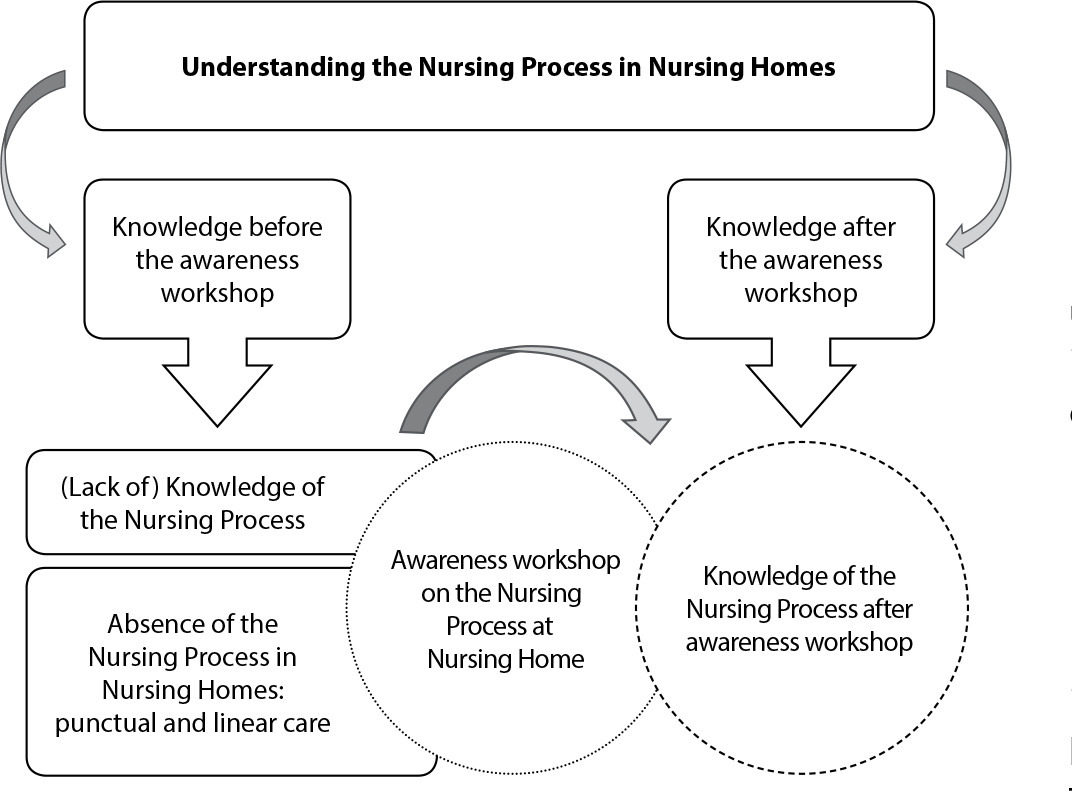
-
ORIGINAL ARTICLE07-29-2024
Excessive daytime sleepiness in nursing technicians: association with sleep quality and memory
Revista Brasileira de Enfermagem. 2024;77(3):e20230332
Abstract
ORIGINAL ARTICLEExcessive daytime sleepiness in nursing technicians: association with sleep quality and memory
Revista Brasileira de Enfermagem. 2024;77(3):e20230332
DOI 10.1590/0034-7167-2023-0332
Views0See moreABSTRACT
Objective:
to investigate excessive daytime sleepiness prevalence among nursing technicians and the association with sleep quality and memory.
Methods:
a cross-sectional, inferential study, carried out in a hospital unit in the state of Goiás between December 2020 and January 2021. Assessments were carried out using the Epworth Sleepiness Scale, the Pittsburgh Sleep Quality Index and the Prospective and Retrospective Memory Questionnaire, instruments validated for the Brazilian context. Bivariate and multivariate logistic regression analyzes were performed.
Results:
the sample consisted of 189 nursing technicians with a 40.9% excessive daytime sleepiness prevalence. In multivariate models, excessive daytime sleepiness was not associated with sleep quality, however there was a significant association with overall memory failures.
Conclusions:
study results demonstrate a high excessive daytime sleepiness occurrence, an association with overall memory failures and the need for psychosocial interventions for nursing technicians.
-
ORIGINAL ARTICLE07-29-2024
Educational technology for multidisciplinary training for managing waiting lists for elective patients
Revista Brasileira de Enfermagem. 2024;77(3):e20230299
Abstract
ORIGINAL ARTICLEEducational technology for multidisciplinary training for managing waiting lists for elective patients
Revista Brasileira de Enfermagem. 2024;77(3):e20230299
DOI 10.1590/0034-7167-2023-0299
Views1See moreABSTRACT
Objectives:
to construct and assess an educational technology for managing patient waiting lists for multidisciplinary training.
Methods:
study supported by Instructional Design – ADDIE model, whose stages of construction of educational technology were developed in the form of a multi-professional training course. Its respective content assessment was carried out by a committee of experts from 2021 to 2022. The analysis occurred based on the proportion of content adequacy with 95% Confidence Interval.
Results:
seventeen products were created as educational technology learning objects: five storyboards; four videos; three comic books; two pedagogical action plans; a mind map; and a YouTube® playlist. Nine experts assessed content adequacy, which reached 0.89.
Conclusions:
this educational technology contributes to the performance of professionals who manage waiting lists by reducing inequalities, alleviating differences, in addition to promoting equity in care and good health for patients in the Brazilian Health System.

-
ORIGINAL ARTICLE07-29-2024
Fuzzy Logic: vulnerability of women who have sex with women to sexually transmitted infections
Revista Brasileira de Enfermagem. 2024;77(3):e20230271
Abstract
ORIGINAL ARTICLEFuzzy Logic: vulnerability of women who have sex with women to sexually transmitted infections
Revista Brasileira de Enfermagem. 2024;77(3):e20230271
DOI 10.1590/0034-7167-2023-0271
Views0ABSTRACT
Objective:
To describe the possibility of applying Fuzzy Logic in analyzing the vulnerability of Women Who Have Sex with Women to Sexually Transmitted Infections/HIV/AIDS.
Methods:
We developed a Fuzzy Logic system with 17 input variables and one output variable, using data related to vulnerability in a municipality located in the Midwest region of the State of São Paulo, Brazil.
Results:
The factor with the greatest positive impact was the confirmation that a low understanding of Sexually Transmitted Infections/HIV/AIDS is associated with higher vulnerability. Conversely, the statement “Not disclosing sexual activity to healthcare professionals,” where individuals do not admit to having sex with women, had the least impact.
Conclusions:
Fuzzy Logic facilitates the identification of vulnerability, expressed through the analysis of interaction between variables in each dimension. This makes it a promising method to assist in analyzing the vulnerability of specific populations.
Keywords:Fuzzy LogicHealth VulnerabilityReproductive HealthSexually Transmitted DiseasesWomen Who Have Sex With WomenSee more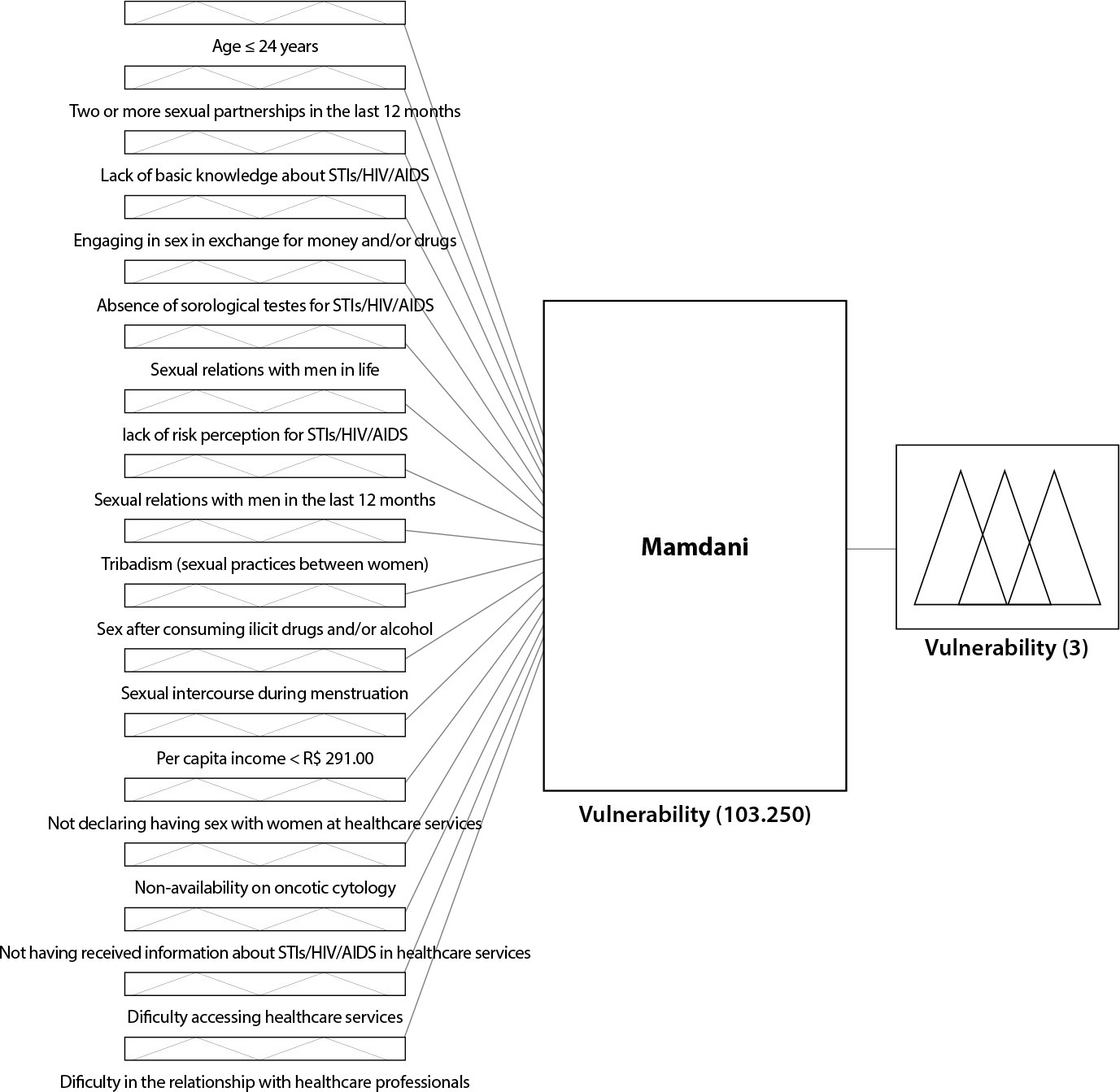
-
ORIGINAL ARTICLE07-29-2024
University Student Depression Inventory, Brazilian Version, Construct Assessment
Revista Brasileira de Enfermagem. 2024;77(3):e20230232
Abstract
ORIGINAL ARTICLEUniversity Student Depression Inventory, Brazilian Version, Construct Assessment
Revista Brasileira de Enfermagem. 2024;77(3):e20230232
DOI 10.1590/0034-7167-2023-0232
Views0See moreABSTRACT
Objectives:
to assess the University Student Depression Inventory, Brazilian version (USDI-BR), construct.
Methods:
a methodological study carried out with a snowball probabilistic sample, consisting of 334 undergraduate and graduate students. Confirmatory factor analysis, reliability using McDonald’s omega coefficient and Cronbach’s alpha were performed. Principal component analysis was performed using the varimax rotation and oblimin rotation, using the Kaiser-Meyer-Olkin criteria, Bartlett’s test of sphericity and scree plot.
Results:
the USDI-BR presented an internal consistency of items of ω = 0.95 and remained with 30 items, with the addition of 1 factor (Death wish and social withdrawal), totaling 4 factors.
Conclusions:
the USDI-BR has evidence that points to its validity and also its internal consistency, deserving that new studies be carried out to expand the evidence of its psychometric properties.
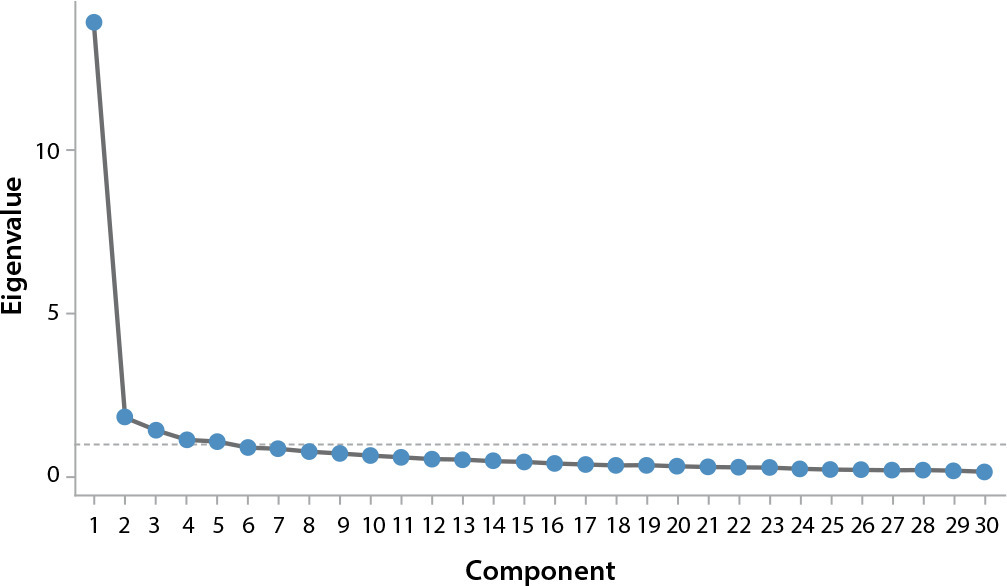
-
ORIGINAL ARTICLE07-29-2024
Family refusal of skin donation for transplantation: trends and associated factors
Revista Brasileira de Enfermagem. 2024;77(3):e20230209
Abstract
ORIGINAL ARTICLEFamily refusal of skin donation for transplantation: trends and associated factors
Revista Brasileira de Enfermagem. 2024;77(3):e20230209
DOI 10.1590/0034-7167-2023-0209
Views0See moreABSTRACT
Objectives:
to analyze the trends and factors associated with family refusal of skin donation for transplantation.
Methods:
this cross-sectional study was conducted in the State of São Paulo, with family authorization terms collected from 2001 to 2020. The variables analyzed included year, age, gender, cause of death, and type of institution. Data were analyzed using linear and multiple logistic regression, with the Odds Ratio estimated at p<0.05 for statistical significance.
Results:
1,355 individuals refused skin donation. The trend of refusals decreased between 2001 and 2009 in the age groups of 0-11 years and 12-19 years, but increased in the group aged ≥60 years. This trend continued to decrease in the 0-11 years group from 2010 to 2020, and increased in the 20-40 years group. Males and the age groups of 20-40 years, 41-59 years, and ≥60 years exhibited 27%, 34%, 47%, and 53% lower chances of refusal, respectively.
Conclusions:
there is an urgent need for measures to mitigate the high number of refusals associated with skin donation.
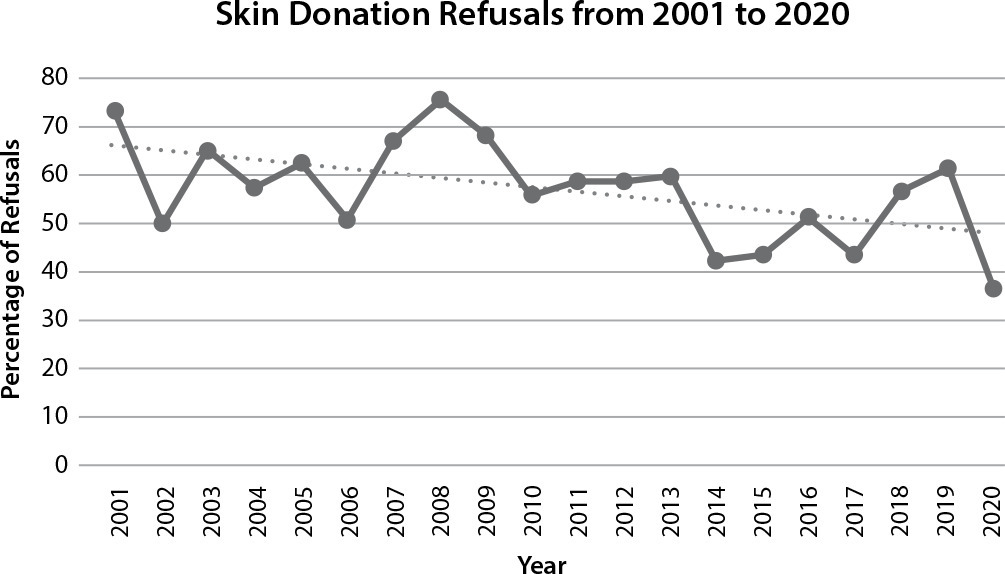
-
ORIGINAL ARTICLE12-13-2024
Nurses’ experience regarding patient safety in mobile pre-hospital care
Revista Brasileira de Enfermagem. 2024;77(5):e20230529
Abstract
ORIGINAL ARTICLENurses’ experience regarding patient safety in mobile pre-hospital care
Revista Brasileira de Enfermagem. 2024;77(5):e20230529
DOI 10.1590/0034-7167-2023-0529
Views0See moreABSTRACT
Objectives:
to understand nurses’ experience regarding patient safety in mobile pre-hospital care.
Method:
a qualitative, exploratory and descriptive study, conducted with nurses active in mobile pre-hospital care services. Semi-structured interviews were conducted, audio-graved and submitted to Bardin’s content analysis.
Results:
from four thematic categories established, nurses reported the care and management skills necessary to work in this service. They demonstrated a commitment to ensuring safe care for patients, staff and spectators. They highlighted the actions taken to prevent and mitigate incidents. However, they based their experiences on practice protocols and individual actions, expressing the need to improve knowledge about patient safety.
Final Considerations:
mobile pre-hospital care nurses’ experience in relation to patient safety was limited, suggesting the need for training on the subject, alignment of work processes and implementation of strategies, aiming to guarantee safe care.
-
ORIGINAL ARTICLE12-13-2024
Repercussions of the pandemic on tuberculosis control actions from the perspective of health professionals
Revista Brasileira de Enfermagem. 2024;77(5):e20230477
Abstract
ORIGINAL ARTICLERepercussions of the pandemic on tuberculosis control actions from the perspective of health professionals
Revista Brasileira de Enfermagem. 2024;77(5):e20230477
DOI 10.1590/0034-7167-2023-0477
Views0See moreABSTRACT
Objectives:
to analyze the repercussions of the COVID-19 pandemic on tuberculosis control actions from the perspective of primary health care professionals.
Methods:
this descriptive study with a qualitative approach was conducted from November 2022 to April 2023, using semi-structured interviews with 11 key informant professionals from primary health care units in a Brazilian capital. Data were organized using Atlas.ti 22.0 software and subjected to thematic-categorical content analysis.
Results:
the pandemic scenario caused alterations in the work process, necessitating abrupt adaptations, and led to detrimental impacts on the health of professionals and tuberculosis control actions, which were reduced or discontinued.
Final Considerations:
there was evident unpreparedness and a lack of resources from various governmental levels and health services to handle the public health emergency situation without severe harm to the provision of essential services.
-
Training of Brazilian indigenous nurses: between human rights, valuing diversity and inclusion
Revista Brasileira de Enfermagem. 2024;77(5):e20230430
Abstract
Training of Brazilian indigenous nurses: between human rights, valuing diversity and inclusion
Revista Brasileira de Enfermagem. 2024;77(5):e20230430
DOI 10.1590/0034-7167-2023-0430
Views0See moreABSTRACT
Objectives:
to analyze the possibilities and potential of training indigenous nurses, given the Brazilian Health System (SUS), understanding the relationships between education and health.
Methods:
theoretical-reflective study, based on scientific literature, aligned with the experience, critical thinking of its authors and the Sustainable Development Goals in Brazil.
Results:
this text articulates three axes: Potential for including indigenous students in nursing training; Paths to achieving equity through inclusion and retention policies for indigenous students at different levels; and Implications of this for the SUS and global health.
Final Considerations:
indigenous students, beneficiaries of affirmative actions, face challenges of inclusion and retention in public universities that directly impact their academic training. Added to this are the difficulties identified in basic education, professor training and implementation of permanence policies, with consequences for services and training at other levels.
-
ORIGINAL ARTICLE12-13-2024
Interobserver agreement in Reception and Risk Stratification in Obstetrics implementation
Revista Brasileira de Enfermagem. 2024;77(5):e20230361
Abstract
ORIGINAL ARTICLEInterobserver agreement in Reception and Risk Stratification in Obstetrics implementation
Revista Brasileira de Enfermagem. 2024;77(5):e20230361
DOI 10.1590/0034-7167-2023-0361
Views0See moreABSTRACT
Objectives:
to analyze interobserver agreement in the Reception and Risk Stratification in Obstetrics protocol implementation.
Methods:
a cross-sectional study carried out during Reception and Risk Stratification in Obstetrics implementation, conducted in a tertiary hospital in southern Brazil with 891 participants in January 2020. Descriptive and interobserver agreement analysis was carried out using the Kappa coefficient in the risk stratification assigned by the triage nurse and reviewed by the researcher.
Results:
around half of the calls (55.6%) were stratified as not very urgent (green), followed by urgent (yellow) (31.8%), very urgent (orange) (9.3%), not urgent (blue) (3.4%) and no emerging stratification (red). Agreement analysis of revised stratification found Kappa values of 0.20 (blue), 0.54 (green), 0.77 (yellow) and 0.80 (orange).
Conclusions:
most appointments were non-urgent. The agreement analysis between the revised and assigned risk stratification revealed greater interobserver agreement as the priority level increased.
-
ORIGINAL ARTICLE12-13-2024
Adaptation and implementation of a Nursing care protocol for children in the Amazon Region
Revista Brasileira de Enfermagem. 2024;77(5):e20230245
Abstract
ORIGINAL ARTICLEAdaptation and implementation of a Nursing care protocol for children in the Amazon Region
Revista Brasileira de Enfermagem. 2024;77(5):e20230245
DOI 10.1590/0034-7167-2023-0245
Views0See moreABSTRACT
Objectives:
to describe the process of implementing an adapted protocol for pediatric nursing care in a health unit located in a municipality in the Amazon Region.
Methods:
methodological research conducted in a basic health unit with four family health teams in the state of Rondônia, involving seven nursing professionals. Data collection occurred between October 2020 and April 2022, following the research phases: situational diagnosis, exploratory phase, protocol definition, implementation, and evaluation.
Results:
the outcome was the adaptation and implementation of a nursing care protocol for children.
Final Considerations:
the adaptation and implementation process can be an effective approach to improving care, strengthening nursing as a profession with a solid foundation in scientific and clinical evidence. This facilitates early problem identification and appropriate guidance, leading to better health outcomes for children.
-
ORIGINAL ARTICLE12-13-2024
Nurses’ experiences in caring for people with mental health problems hospitalized due to clinical comorbidities
Revista Brasileira de Enfermagem. 2024;77(5):e20230136
Abstract
ORIGINAL ARTICLENurses’ experiences in caring for people with mental health problems hospitalized due to clinical comorbidities
Revista Brasileira de Enfermagem. 2024;77(5):e20230136
DOI 10.1590/0034-7167-2023-0136
Views0See moreABSTRACT
Objectives:
to understand nurses’ experiences in caring for people with mental health problems hospitalized due to clinical comorbidities in non-psychiatric Inpatient Units.
Methods:
qualitative study, guided by Alfred Schutz’s social phenomenology. Sixteen phenomenological interviews were conducted. The content was analyzed and discussed based on the literature, through the composition of three categories of analysis.
Results:
three categories emerged in the study: Challenges in care faced by nurses; Fragmented care action; and Ideal care. The disarticulation of the clinic was revealed, as described by nurses, showing care as an action far removed from the comprehensiveness of a person. Nurses’ performance is guided predominantly by biomedical reference, disregarding appreciation of subjectivity.
Final Considerations:
it was observed that nurses attribute the responsibility for patient care to factors external to their life-world, when, in fact, these aspects should be components that help them in comprehensive care construction.
-
REVIEW11-29-2024
Assessment of knowledge in oncology about care for transgender people: a scoping review
Revista Brasileira de Enfermagem. 2024;77:e20230532
Abstract
REVIEWAssessment of knowledge in oncology about care for transgender people: a scoping review
Revista Brasileira de Enfermagem. 2024;77:e20230532
DOI 10.1590/0034-7167-2023-0532
Views0ABSTRACT
Objective:
to identify evidence available in the literature on instruments and methodologies used to assess healthcare professionals’ knowledge about cancer care for the transgender population.
Methods:
a scoping review was conducted in seven databases, including studies that answered the question: what is the healthcare professionals’ level of knowledge about cancer care for the transgender population?
Results:
forty-one articles were selected that dealt specifically with healthcare professionals’knowledge in relation to care for the LGBTQIAPN+ population, especially the transgender population. Eighteen studies assessed patients’ perceptions of professionals’knowledge, whereas other studies used their own assessment tools, considering the global context of LGBTQIAPN+ health.
Conclusions:
there is no tested and validated instrument that assesses the knowledge about the transgender population’s oncological health, highlighting the need to construct and validate an instrument focused on this population’s needs.
Keywords:Health Services for Transgender PeopleNeoplasmsOncologyProfessional TrainingTransgender PeopleSee more
Search
Search in:
Nuvem de Tags
Aged (144) Atenção Primária à Saúde (239) COVID-19 (104) Cuidados de Enfermagem (269) Educação em Enfermagem (151) Educação em Saúde (139) Enfermagem (930) Estudos de Validação (131) Health Education (144) Idoso (208) Mental Health (149) Nursing (987) Nursing Care (306) Patient Safety (151) Primary Health Care (284) Qualidade de Vida (104) Quality of Life (106) Saúde Mental (145) Segurança do Paciente (150) Validation Studies (108)



